Could Apple’s iPhone 4 be cursed?
- Share via
Could anything else go wrong with the iPhone 4?
The popular device has been plagued by misfortune — including the suicide of a Chinese worker, lost prototypes and a shaky debut last month, where Apple Inc. Chief Executive Steve Jobs could not get the phone to connect to the Internet.
Now, in what amounts to a rare acknowledgment of a misstep, Apple Inc. has scheduled a news conference Friday where it is expected to announce its response to widespread complaints about the phone’s antenna.
Analysts say potential remedies range from giving customers a free protective case to launching a massive recall that could cost Apple $1.5 billion.
The string of woes have been so striking that some have sought alternative explanations, including the notion that the phone may simply be jinxed. One theory focuses on the number four.
In China, where the iPhone is manufactured, four is considered to be bad luck. That’s largely because the word for four is nearly identical to the word for death. Many buildings in Hong Kong do not have a fourth floor, and people try to avoid phone numbers and license plates with “4” in them.
Device manufacturers such as Canon Inc. and Nokia Corp., wary of the digit’s ominous significance, have been known to skip from 3 to 5 when assigning model numbers to their products. Apple, though, seemed uncowed by the superstition.
The number requires a degree of care and attention that Apple may not have heeded, according to numerologist Daniel Hardt of Indianapolis.
“If shortcuts are attempted, the whole thing falls apart,” Hardt said. “The 4 can also be karmic, having some overtones of a problem stemming from some past activity. It seems very likely to be the case that there is some karma at play in this situation that has caused the phone to not be as functional as it should be.”
Lydia Chen, associate director of the Fairbank Center for Chinese Studies at Harvard University, said she grew up “knowing that number 4 was something you avoided.”
“I would personally never say it’s the number 4 causing all of this,” she said. “Still, maybe people should avoid iPhone 13 when it gets here.”
The story begins exactly one year ago — long before the public knew anything about Apple’s fourth generation iPhone.
On July 16, 2009, a 25-year-old Chinese factory worker leaped from the window of his apartment building and fell 12 stories to his death. He had been accused by his superiors of losing an iPhone 4 prototype.
Months after the incident in China, an Apple engineer out drinking at a pub in Silicon Valley lost track of the iPhone 4 prototype he was testing — and pictures of it ended up all over the Internet.
When Steve Jobs introduced the new phone last month in front of a huge audience of reporters and Apple developers, it failed to connect to the Internet.
And since the phone’s release, it’s been plagued by reception problems blamed on everything from software to cellular network to antenna design.
Most recently, Consumer Reports won’t recommend the iPhone 4 because of what it called a “design flaw” in the antenna.
Apple did not respond to a question about the phone’s luck — or lack thereof.
“The whole situation has been very strange for Apple,” said Kevin Tofel, an editor with the technology website GigaOm. “This tarnishes the ‘it just works’ mantra that people associate with their brand.”
As the latest problems have surfaced, the company, known for its tightly controlled approach to public relations, has been hit by a wave of public mockery.
On his late-night talk show Tuesday, David Letterman lampooned the company by reading a list of the “top 10 signs you’ve purchased a bad iPhone.”
At an industry conference on Wednesday, Microsoft Chief Operating Officer Kevin Turner said he “did cartwheels” after reading about Apple’s antenna issue. He then took a shot at Apple by invoking one of his own company’s most disastrous products.
“It looks like the iPhone 4 might be their Vista, and I’m OK with that,” he said. “That’s another mantle they’re welcome to take.”
On Thursday, Sen. Charles Schumer (D-N.Y.) wrote to Jobs saying the company’s remedies for the antenna issues were “insufficient” and urging Apple to fix the problem free of charge.
Even some longtime Apple fans have been less than ecstatic about the phone.
Phil Hodgen, 53, an international tax attorney in Pasadena, said that over the years his family has become Apple zealots, owning a slew of iMacs, Macbook Pros and iPhones. So it was no surprise when his wife bought an iPhone 4.
But after five days’ worth of dropped calls, she decided to return the device — and Hodgen canceled an order for an iPhone of his own.
“I’m waiting to see what Apple does,” he said. “I hope they own up to the fact that they screwed up.”
Initially, Apple recommended that users avoid holding the phone in a way that could affect the antenna’s performance. It then blamed the problem on a software bug that made the phone’s signal appear stronger than it was.
Phil Stevens, a professor at SUNY Buffalo who studies superstition, said the iPhone’s problems could be considered bad luck, a jinx, or even a curse — all versions of what he called “magical beliefs” that gain traction in tougher times, when reason often takes a back seat to fear and anxiety.
“A jinx is the idea that cosmic forces that surround us are somehow out of whack,” he said, whereas a curse requires that someone actually pronounce an imprecation.
“To say it’s cursed, you’d have to go back and find the person who cursed it,” he said. “Because who would do this?”







